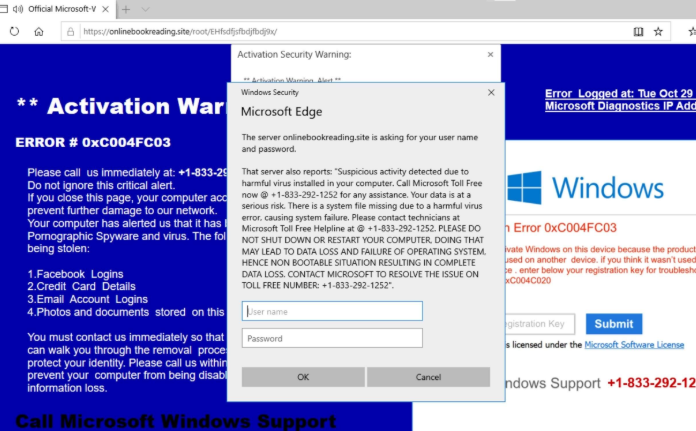Remove ERROR 0xC004FC03 POP-UP Scam
What is ERROR 0xC004FC03 POP-UP Scam
ERROR 0xC004FC03 POP-UP Scam refers to a tech-support scam that claims Microsoft cannot activate your computer because the product key has already been used to activate another device. To resolve the issue, the scam asks that you call the provided number to be connected to Microsoft technical support technicians. Except instead of Microsoft technicians, you would be dealing with professional scammers because the whole thing is a scam.

The scam error notification is shown in your browser, which is the first sign pointing to it being malicious. Legitimate notifications from Microsoft will never be displayed in your browser. Users are usually redirected to these scam pop-ups by the sites they were visiting, or by adware. If it’s the former, as long as you avoid dubious sites or have adblocker installed, you should be fine. However, if you are dealing with adware, you will need to get rid of it first to remove ERROR 0xC004FC03 POP-UP Scam permanently.
You don’t need to interact with the pop-up, and certainly do not need to call the provided number. If you do call, you’d be connected to professional scammers who would request to remotely access your computer. If access is granted, they could steal or delete files, lock the computer until you agree to pay, etc.
Why is the ERROR 0xC004FC03 POP-UP appearing on your screen
There could be a couple of reasons why this scam is popping up. The most obvious one is you were simply redirected. A lot of questionable sites (usually ones hosting adult, free copyrighted, or gambling content) redirect users to weird websites, including the one showing this scam. You can protect your computer by simply adding an adblocker to your browser.
However, if you have seen the pop-up numerous times, even when you’re on a completely legitimate site, adware could be installed on your computer. Adware is a minor but quite annoying infection that you can accidentally install together with free software. Free programs often come together with additional offers such as adware, browser hijackers and potentially unwanted programs. If you do not deselect them when installing freeware, they will install alongside without you even noticing.
When you’re installing free programs, you need to opt for Advanced (Custom) settings. Those settings will make all extra offers visible, and you will be able to deselect all of them. We always recommend deselecting the offers because while they may seem useful at first, they’ll only be a nuisance. After you have unchecked the offers, you can continue installing the program.
Is the ERROR 0xC004FC03 POP-UP legitimate?
Users are usually redirected to a certain website that has blue background with a warning about an error 0xC004FC03. A couple of pop-ups then appear, mostly saying the same thing as the site, that there has been error with your product key and your Windows cannot be activated. Furthermore, the fake alert warns that malware could inhabiting your computer and stealing your social media logins, bank login credentials, files, etc. It’s a fairly typical scam message, and if you have encountered these scams in the past, you’ll recognise it immediately.
The pop-up warns that you need to call the provided phone number in order to solve the issues. If you were to call, you’d be connected to professional scammers pretending to be legitimate Microsoft technicians. They usually ask victims to allow them to remotely access the computer so they could “fix” it. If they do remotely connect, they will try to make it seem like they’re doing something to identify the problem while trying to look through your documents to find potentially important ones. They’ll download and install a program for you while claiming it’s a security tool that will fix everything. By the end of the session, you’ll be asked to pay hundreds of dollars.
These scammers prey on less tech-savvy users, usually older people. There are plenty of videos on YouTube demonstrating these scams if you want to learn more. But keep in mind that these “notifications” about viruses and other issues on your Windows appearing in your browser will never be legitimate. Microsoft does not keep track of which computer is infected, nor do they care, thus they never show these kinds of alerts. The only reliable warnings about malware on your device will come from your anti-malware program.
ERROR 0xC004FC03 POP-UP Scam removal
If you were redirected by a website, you don’t need to do anything besides enabling adblocker. However, if you are constantly seeing the pop-up and being redirected, we suggest you scan your computer for adware. If adware is responsible, you will need to get rid of it to delete ERROR 0xC004FC03 POP-UP Scam from your screen.
Site Disclaimer
WiperSoft.com is not sponsored, affiliated, linked to or owned by malware developers or distributors that are referred to in this article. The article does NOT endorse or promote malicious programs. The intention behind it is to present useful information that will help users to detect and eliminate malware from their computer by using WiperSoft and/or the manual removal guide.
The article should only be used for educational purposes. If you follow the instructions provided in the article, you agree to be bound by this disclaimer. We do not guarantee that the article will aid you in completely removing the malware from your PC. Malicious programs are constantly developing, which is why it is not always easy or possible to clean the computer by using only the manual removal guide.
